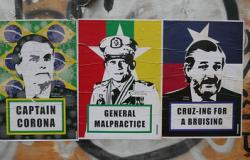On Identity Capital, Markets, and the Rise of Populism

Ethnic, racial, and religious distinctions ground national identity – which can fuel populism. Expert Vinícius G. Rodrigues Vieira on his new book and how identity capital helps shape global governance.
What is your book about in a nutshell?
Shaping Nations and Markets develops a theoretical framework to make sense of the rise of nationalist-populist movements in the 21st century. Instead of assuming that the current wave of populism stems from backlash against economic globalisation, I investigate how material and symbolic factors interact with each other in advanced industrial democracies and emerging powers to generate the political movements that brought politicians like Jair Bolsonaro in Brazil, Narendra Modi in India, and Donald Trump in the United States into power.
A crucial part of the argument is the concept of identity capital. In a nutshell, I argue that ethnic, racial, and religious cleavages are what ground narratives of national identity. Hence, minorities (like the Brazilian Evangelicals crucial for Bolsonaro’s victory in 2018) or vanishing majorities (like non-Hispanic whites in the US) have incentives to increase or at least keep their identity capital – that is, the form of power that stems from their recognition as members of the nation.
Identity capital matters for identifying those who hold more political power within a given sovereign state because a nation is more than just its economy, political institutions, and organised interests. It also has a symbolic face that defines the boundaries of the social field. Drawing on sociological theory, particularly the contributions of Pierre Bourdieu, I define a field as “…a social space in which both individual and collective players are embedded and empowered according to different levels of capital” (p. 7).
Apart from applying the notion of identity capital to explaining populism in those three cases, I also unfold the long-duration process through which different conceptions of national identity have interacted with liberalising and protectionist coalitions since the onset of the World Trade Organisation’s Doha Development Agenda (WTO’s DDA) negotiations in 2001.
What is new about your findings?
To the best of my knowledge, Shaping Nation sand Markets is the first book to systematically compare the rise of populism in cases from both the Global North and the Global South. Apart from exploring the core cases of Brazil, India, and the United States, the book explores Brexit and the Conservatives’ subsequent lack of strength to mobilise a nationalist-populist political base in the UK; the absence of meaningful populist movements in Canada’s party politics; and the rise of a left-wing populism in Mexico that praises the country’s indigenous legacies over European ones.
As I argue in the book, populism should be understood as the process through which identity capital is mobilized and, hence, narratives of national identity are contested. So, more than discontent with the redistributive effects of economic globalisation, the rise of Bolsonaro, Modi, and their populist counterparts in the Global North – particularly Trump in the United States – results from the mobilisation of specific ethnic, racial, and religious segments with the aim of changing longstanding narratives of national identity. The transformation of what it means to be Brazilian, Indian, and American, in turn, empowers certain social groups and economic sectors over others.
For instance, in the case of Brazil, there is a high correlation between economic sectors, such as agribusiness, that concentrate most non-white workers (who represent the Brazilian ideal of racial diversity, now strongly contested by Evangelicals who want a Christian-centric nation) and the pursuit of liberalisation, which nevertheless failed. In India, Hindu-dominated regions backed liberalising interests, an expression of the affinities between Hindutva and neoliberalism. In the United States, since the early 2000s there has been a growing association between whiteness and opposition to trade liberalisation – seen in the growing nationalist-protectionist rhetoric associated with a white-centric discourse and opposition to a multicultural America.
What does this mean for the future of multilateralism?
The fact that all three core cases were the main negotiating parties of the WTO’s DDA along with the EU suggests that the limits of multilateralism depend on struggles over the redistribution of material and symbolic elements within each state. As liberalising and protectionist coalitions each combined different degrees of identity capital in each stage of negotiations, it is plausible to argue that distinct conceptions of national identity have the potential to drive countries’ outlook on intergovernmental organisations and the structure of global governance itself.
Since the July 2008 Geneva deadlock, for instance, not much progress has been made in the WTO’s DDA negotiations. At that time, Brazil pushed for liberalisation that would have favoured the agribusiness sector. India, which was then governed by a coalition that espoused a conception of national identity rooted in secularism at the expense of Hindu nationalism, turned protectionist. So did the US, which in that year elected Barack Obama as president and yet insisted on opening trade through so-called mega-trade agreements such as the Transatlantic Trade and Investment Partnership (TTIP) and the Trans-Pacific Trade Partnership (TTP), both of which would be later dismantled by the Trump administration.
The fact that identity capital drove Brazil towards the pursuit of liberalisation indicates that nationalism is not a force that always runs against multilateralism. The concept of identity capital illustrates this point in other contexts, too. For instance, Brexit mobilised a notion of Britishness and more specifically of Englishness that did not welcome migration. Yet, trade with the EU continued under a different agreement. While the affinities between nationalism in society and protectionism in the market tend to prevail, they do not necessarily result in less cooperation. Nations will therefore make of economic multilateralism whatever their domestic distribution of identity capital allows.
This blog post is based on the author's bookShaping Nations and Markets. Vinícius G. Rodrigues Vieira is an Associate Professor of Economics and International Relations at the Fundação Armando Alvares Penteado (FAAP), Brazil.
This first appeared on the ENSURED website.
Photo: duncan cumming / Flickr


